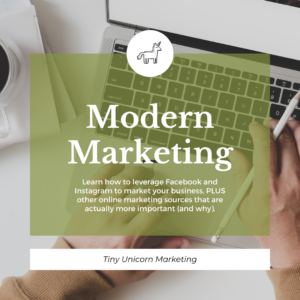
When I started my blog in 2008, it was so I could share my journey to getting out of debt. Little did I know that those efforts would lead to natural living and minimalism. With consistency and focused marketing, it grew to a top 15 natural living blog.
Fast forward 15 years (OMG) and I now work with small business owners with online marketing. In the last few years I’ve shifted primarily to working with local businesses and it seems like they all have the same problems when it comes to online marketing: they are SO overwhelmed with all the available advice/options, they don’t even know where to start and they can’t understand why their efforts aren’t working.
I can’t tell you how many times I’ve heard things like:
“I don’t understand why I didn’t get more people to my event/got more sales/brought in new customers. I posted it on social media.”
After a little digging, I figure out what the problem is and it’s almost always one of these:
1. Posting inconsistently
Businesses that fail to post consistently on social media platforms are likely to lose followers and fail to engage with their audience.
It’s like starting a relationship with a new person. It’s exciting and novel and you chat everyday. But one day they ghost you and you never hear from them again. Or you do, but it’s so sporadic that you write them off.
If you’re going to use social media for your business, you need a plan for posting consistently.
2. Failing to understand the target audience
Businesses need to understand their target audience in order to create content that resonates with them. Failure to do so can result in ineffective campaigns and missed opportunities.
Imagine you really love vegetable gardening and you start following an account because of a great series of posts they did on growing tomatoes, thinking you’d get more similar content. Except they post on a variety of random things and vegetable gardening is rarely one of them. Frustrated, you unfollow them because they’re cluttering your feed with stuff you don’t care about.
If you’re posting on social media, it needs to be relevant to what your target audience wants.
3. Overpromoting or overselling
Businesses that are too promotional or sales-focused on social media can turn off followers and fail to build meaningful connections with their audience.
We’ve all had that one person from high school that you’ve been friends with on Facebook for years. You never chat with each other and you’ll like each other’s stuff if it shows up in your feed, but there’s no real relationship. And then they join an MLM and all of a sudden they’re sliding into your DMs to try to sell you an amazing opportunity. NOBODY LIKES THAT. It feels gross. That’s what it feels like if you’re using social media solely to sell or promote your business. This tool is for building relationships.
If you’re using social media for your business, you need to use it as a tool to build trusting relationships with your audience.
4. Failing to track and measure results
Without tracking and measuring their social media efforts, businesses won’t be able to identify what works and what doesn’t. This can result in wasted time and resources on ineffective campaigns.
The wonderful thing about social media is the data it provides you with (if you have a business profile). Over time, it gives you a great idea of what your audience loves and what they don’t seem too enthused about. You can take that information and use it to create your future content and pay to boost the popular posts.
If you’re not paying attention to the metrics, you’re wasting time and money.
5. Relying solely on social media for marketing
Businesses that use social media as their sole means to connect with potential customers are at high risk of losing contacts.
Why is that? Because you don’t own those platforms. Facebook is notorious for changing its algorithms (same with Instagram now that it’s owned by Meta). That means that they decide which of your followers see what you post and how frequently. You need ways to connect with your customers that you own so they can’t interfere with your business every time they change the algorithm.
Social media is a great tool, but it shouldn’t be the only way you connect with your audience.
So what do you do instead?
- Identify your target audience so you know who you’re talking to.
- Create a content plan that provides relevant information to that specific audience. Show them how your business can help them. Every so often, promote a product or service you offer.
- Post consistently on social media.
- Engage with your audience, even if they leave negative feedback.
- Create a website for your business if you don’t have one already. Add a signup page for your mailing list.
- Create a mailing list and ask them to join it. You can offer a helpful freebie in exchange. Link to the signup page on all your social media platforms.
- Create a freebie to send them if you offer one.
- Analyze the data you get from social media to see if you need to adjust your approach.
- Repeat.
Need more help?
 Modern Marketing
Modern Marketing
If you need more help with social media and online marketing in general, get the Modern Marketing class recording.
This is recording of an online class.
You’ll receive a link to the recording and a PDF workbook. They’re yours forever. But please do make the time to listen to it. I appreciate you paying for the class, but more than that, I want to see it actually help your business.
Here are the key things you’ll learn:
How to leverage Facebook and Instagram to market your business, including:
- What you should be posting and how often.
- How to make posts that make people stop scrolling and pay attention to what you’re saying.
- Effective ways to advertise on those platforms.
PLUS other online marketing sources that are actually more important (and why)
- Why you really do need a website, even if it is super basic.
- The reason why you get so many emails from businesses – and why that works.
Are you in? Sweet.

